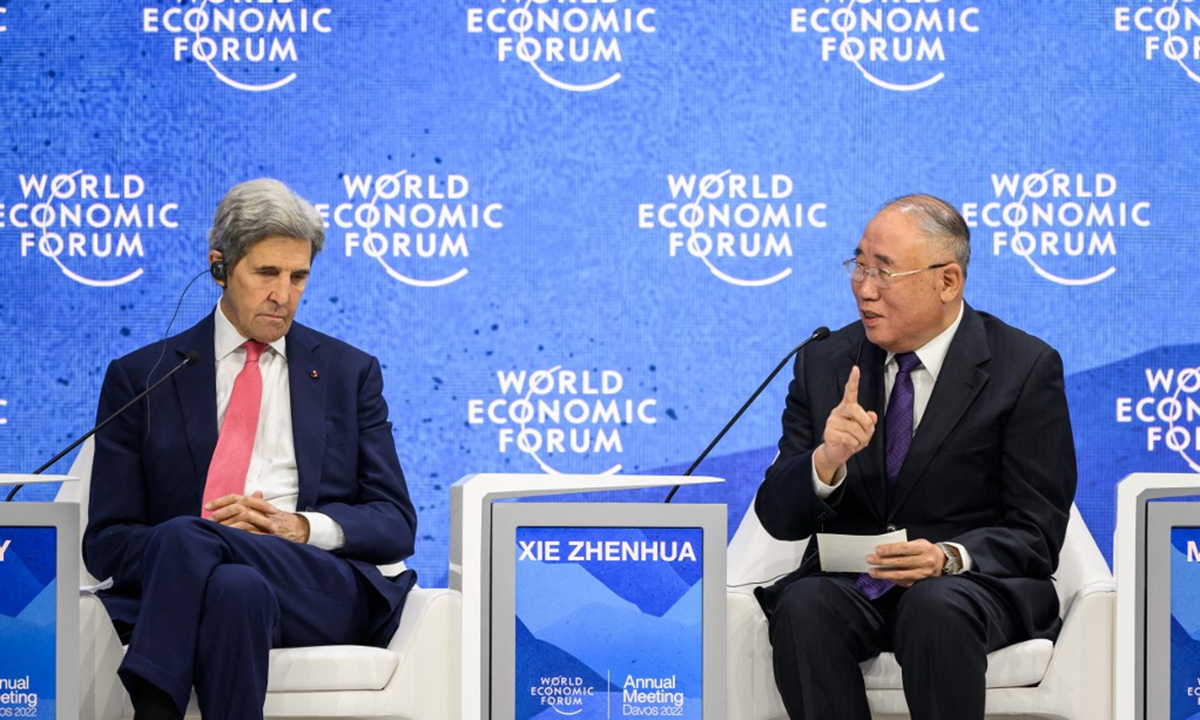China's special envoy for climate change willing to travel to US to negotiate about climate cooperation

China's special climate envoy Xie Zhenhua (right) meets with US climate envoy John Kerry (left) during a session at the World Economic Forum annual meeting in Davos in 2022. Photo:AFP
China's special envoy for climate change Xie Zhenhua said on Thursday that he is willing to travel to the US to talk to his US counterpart John Kerry about the two countries' climate cooperation and to strive to achieve a positive result. The Chinese special envoy revealed he and Kerry have held video conferences once every two weeks to negotiate about climate cooperation between China and the US as well as key issues of the upcoming climate change conference in Dubai.
With less than a hundred days until the 28th UN Climate Change Conference of the Parties (COP 28), China has engaged in intensive dialogue and consultations with the US, Europe, and other relevant parties to seek solutions to the issues that have caused disagreements regarding the conference and to push for a successful COP28, Xie said on Thursday, at the 9th China and Globalization Forum held by the Beijing-based think tank the Center for China and Globalization.
"In the past two months, Kerry and I have held almost biweekly video conferences to discuss the next meeting arrangements and to initiate the work of the climate action working group, as well as key issues of COP28... I proposed to Mr. Kerry that if necessary, I can also go to the US for discussions to achieve positive outcomes for the benefit of both countries and the people of the world," Xie said.
COP28 is due to be held in Dubai from November 30 to December 12 and it will take stock of world's progress on climate change since the Paris Agreement was adopted in 2015.
On Thursday, Xie also presented the key points that will be involved in COP28, about the promotion of energy transition.
"We should respect the national conditions of each country, and ensure a fair transition. First, we should adopt an open attitude toward the development of global renewable energy goals at COP28 that can be accepted by all parties," said Xie, adding that the conference should not only discuss the goals but also consider their feasibility and the necessary conditions for their realization.
He also expected COP28 to make follow-up arrangements to fulfill the commitment of doubling adaptation finance and promoting the operationalization of the loss and damage fund, providing a clear timetable and roadmap to give developing countries hope.
As global greenhouse emissions continue to rise, and climate change wreaks more havoc upon the people and places least responsible for the problem, rich polluting countries are now three years overdue on their promise to mobilize $100 billion a year in climate finance for low- and middle-income countries, a recently revealed report showed.
Rich nations failed to meet a long-standing pledge to deliver $100 billion to help poorer countries cope with climate change, the OECD said in 2022.
Xie said the realization of this goal matters for the mutual trust of global south and north countries. He noted that both Kerry and Frans Timmermans, executive vice president of the European Commission for the European Green Deal, as well as colleagues from developed countries have informed him that such goal will be realized, "that is good news."
Only when developed countries have sufficient public funds in place can they send positive policy signals, and push multilateral development banks, international financial institutions, private sector, and social funds to send more financial support to developing countries and the global green, low-carbon, and climate-resilient development sectors, Xie noted.
The envoy also highlighted the damage caused by trade protectionism and unilateral measures on climate change.
He cited research showing that if trade protectionism continues, it is expected that the price of photovoltaic modules will be 20 to 25 percent higher by 2030. This is detrimental to achieving the goal set at this year's G20 Summit when members agreed to triple the total renewable energy capacity and to underscore the global need for over $4 trillion of annual investments until 2030.
We hope that relevant countries will not politicize the cooperation in the new-energy industry and instead formulate fair, open, and non-discriminatory trade policies that treat domestic and foreign enterprises and products equally, Xie warned.
Global Times

